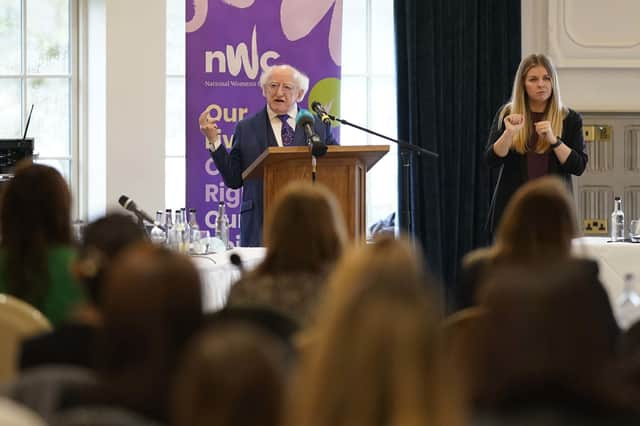Ben Lowry: Surprise us President Higgins, say something nice about Britain


This was particularly so after Brexit, when the UK was accused of imperial delusions, of British exceptionalism, etc.
Commentators, politicians and academics level these criticisms.
Advertisement
Hide AdAdvertisement
Hide AdYet it is a marvel to watch nationalist Ireland’s own version of exceptionalism — an apparently deep seated belief in Irish probity compared to a shoddy UK, run by entitled toffs like Boris Johnson.
This mindset was evident in the first phase of the pandemic, until it became clear that few western nations had handled Covid strikingly well. The UK did get much of its early response badly wrong but then became a global leader in terms of vaccine development and rollout.
Yet when there was a flow of articles in Ireland, or penned by Irish authors in UK papers, attacking London’s handling of the pandemic, there was no reaction in Britain.
You might say this is a reflection of British arrogance, and that is partly true (in that such criticism is barely even noticed). But it is noticed in informed circles, where the lack of response is rooted in an intuitive understanding that Ireland can attack Britain but by goodness Britain can’t attack Ireland.
Advertisement
Hide AdAdvertisement
Hide AdImagine if Ireland was perceived to be wrong on a major matter of public policy, and British commentators said so publicly and repeatedly in media on either side of the Irish Sea. I have never seen that happen, and do not expect to see it.
Thus the truth is almost the opposite of the caricature: far from the UK believing in its greatness, it is full of self criticism, while it is Ireland that can act superior. Its president, Michael D Higgins, illustrates this double standard. It is often said that he has done much for reconciliation, which is true in that he has attended a range of ceremonies that show respect for all traditions, including the British and unionist ones. But he talks as if he has an entrenched belief in the historical moral goodness of Ireland and the wrongness of Britain. From time to time he wants to scold us about it.
Observers this week, such as the artist Brian John Spencer, have pointed out how inappropriate it is that the head of state of a country which has a school system dominated by the Catholic church should lecture us in Northern Ireland on integrated education.
If he was going to attack separate education in NI, why did he not single out the Catholic church for criticism? People talk about Catholic and Protestant schools but as far back as the 1980s, when I was in class, many so-called Protestant schools were schools with a distant church origin that had long since become largely secular and mixed.
Advertisement
Hide AdAdvertisement
Hide AdSchools with a religiously mixed intake were somewhat atypical in that they tended to be grammar schools with many middle class pupils. Even so, it was a trend that has become marked with time. Some such ‘Protestant’ schools in greater Belfast have a 50:50 pupil mix.
To this day few Catholic schools have that level of integration.
Aside from the odd grumble, unionists or British people say little in response to the judgemental speeches from President Higgins.
It is hard to imagine a British royal uttering any historical criticism of Ireland. Or even a UK cabinet minister doing so, let alone repeatedly making such speeches.
Advertisement
Hide AdAdvertisement
Hide AdPatience with President Higgins did briefly snap over the Armagh centenary service. An event that was made so neutral that it barely mentioned Northern Ireland, and certainly did not dare to celebrate it, was nonetheless too much of a recognition of NI for him.
Yet his criticism over the years has kept coming: he turned down an invite to an RIC memorial; he instructed unionists to be generous over 1916; he said Britain must face up to its history of reprisals; he accused Britain of feigned amnesia over imperialism; of not treating the Irish as equals; over the famine; for its handling of an Indian mutiny.
Here is a suggestion to President Higgins. If he is going to impart his views so freely, and if he is keen on reconciliation, then surprise us.
Talk about Troubles statistics, and acknowledge the unionist wound, particularly in border areas, at the fact that republicans killed twice as many people as anyone else, and often fled to a Republic that would not extradite them.
Advertisement
Hide AdAdvertisement
Hide AdIf that is too stark a topic, then speak of the good things, such as the lingering British cultural and physical infrastructure in the Republic — the architecture or the system of laws and parliamentary democracy.
• Ben Lowry (@BenLowry2) is News Letter editor
Other opinion articles here:
• Henry McDonald: Fans on both sides of divide agree that football stadiums are a disgrace
Advertisement
Hide AdAdvertisement
Hide Ad• Anna Faro: Big surge in empty pews just another problem for churches that were already struggling pre-pandemic
• Ruth Dudley Edwards: Doug Beattie’s engagement policy gets a boost from Alliance